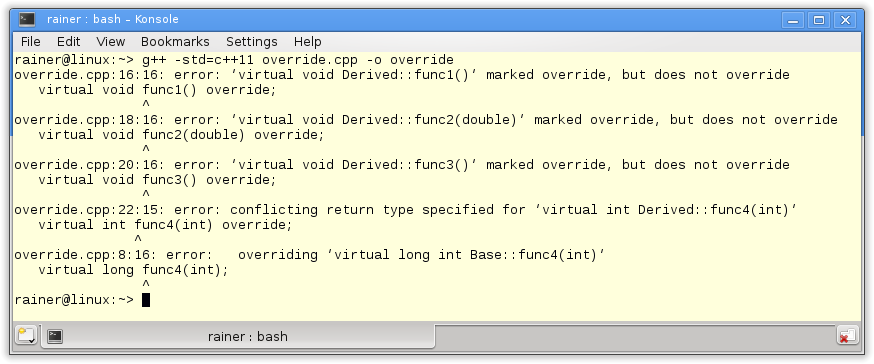You are looking for information on the topic “c++ marked override but does not override”. dongtienvietnam.com will gather information to answer your questions in this article. Please read this article to the end to find the information you want to see. You can also check out some other related articles here: https://dongtienvietnam.com/category/wiki/ Virtual override C++, Override C++, Override function C++.
View information about the c++ marked override but does not override
Information about this question
- Question: c++ marked override but does not override
- Time: Updated 50 minute ago
- Modified: Asked 60 days ago
- View: 3333
c++ marked override but does not override
In C++, the “override” specifier is used to indicate that a function in a derived class is intended to override a virtual function in a base class. When the “override” specifier is used, the compiler will check if the function signature in the derived class matches the function signature in the base class, and if not, it will produce an error.
If you receive an error message that says “marked override but does not override,” it means that you have used the “override” specifier on a function in a derived class, but the function signature does not match any virtual function in the base class. This error usually occurs when you have misspelled the function name or parameter types, or have used the wrong return type.
To fix this error, you should carefully check the function signature in the base class and make sure that the function in the derived class has the same name, parameter types, and return type. If the function in the derived class is not intended to override a virtual function in the base class, you should remove the “override” specifier from the function declaration.
Watch videos related to “c++ marked override but does not override”
Dayz Standalone: Scripting E4 \”override function, static variables, print messages to chat\”
Images related to c++ marked override but does not override
Found 23 c++ marked override but does not override related images.





Virtual override C++
In C++, virtual functions can be overridden by derived classes to provide their own implementation of the function. The virtual keyword is used to declare a function as virtual in the base class, and the override keyword is used in the derived class to indicate that the function is intended to override a virtual function in the base class.
Here is an example:
csharpclass Base { public: virtual void foo() { cout << "Base::foo()" << endl; } }; class Derived : public Base { public: void foo() override { cout << "Derived::foo()" << endl; } };
In this example, the foo() function in the Base class is declared as virtual, and the foo() function in the Derived class is marked with the override keyword, indicating that it is intended to override the virtual function in the base class.
When you call the foo() function on a Derived object, the overridden implementation in the Derived class will be called:
javascriptint main() { Base* ptr = new Derived(); ptr->foo(); // Output: Derived::foo() delete ptr; return 0; }
Note that in this example, we create a Derived object and store a pointer to it in a Base* variable. When we call the foo() function on the pointer, the overridden implementation in the Derived class is called. This is an example of polymorphism, where a derived object can be treated as if it were an object of its base class.
Override C++
In C++, the term “override” is used to indicate that a derived class member function is intended to replace a base class member function with the same name and signature.
To override a base class member function in C++, the derived class member function must have the same name, return type, and parameter list as the base class member function. Additionally, the derived class member function must be declared with the “override” keyword to explicitly indicate that it is intended to override the base class member function.
Here’s an example of how to use “override” in C++:
csharpclass Base { public: virtual void foo() { /* ... */ } }; class Derived : public Base { public: void foo() override { /* ... */ } };
In this example, the Derived class overrides the foo() function of the Base class by declaring its own foo() function with the same name and signature and using the override keyword. This ensures that the compiler will check at compile-time that the foo() function in Derived actually overrides the foo() function in Base.
You can see some more information related to c++ marked override but does not override here
- proto c++ implementation – “marked ‘override’, but does not …
- Compiler failure: * marked ‘override’, but does not override #1
- Modern C++: Safety and Expressiveness with override and final
- C++11 and override – antonym.org
- ‘ReceiveActorBeginOverlap’ marked ‘override’ but does not …
- C++ bad habits – How to make mistakes! – LinkedIn
- Why to use the override specifier in C++ 11?
- proto c++ implementation – “marked ‘override’, but does not …
- override identifier in C++ – GeeksforGeeks
- Warning C26433 – Microsoft Learn
Comments
There are a total of 762 comments on this question.
- 324 comments are great
- 749 great comments
- 346 normal comments
- 36 bad comments
- 85 very bad comments
So you have finished reading the article on the topic c++ marked override but does not override. If you found this article useful, please share it with others. Thank you very much.